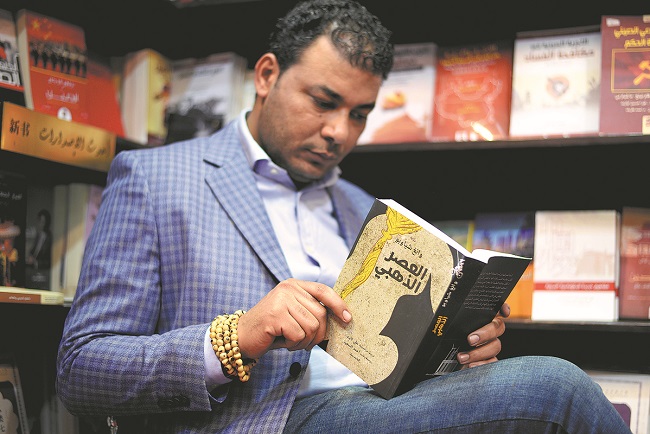

ahmed elsaid reads some chinese literature that has been translated to arabic. china daily
editor's note: china daily presents the series friends afar to tell the stories of people-to-people exchanges between china and other countries. through the vivid narration of the people in the stories, readers can get a better understanding of a country that is boosting openness.
when ahmed elsaid, an egyptian university student in cairo, chose to study chinese in 2001, it was an act of youthful rebellion against his parents' wish for him to become a doctor. armed solely with photocopied textbooks and a handful of books about china, elsaid embarked on a linguistic journey that would eventually transform into a lifelong career dedicated to cultural exchange between china and the arab world.
but his journey was far from easy.
"learning chinese is difficult," said elsaid, now an egyptian sinologist and ceo of the bayt al-hekma cultural group. "but the charm of the chinese language is diverse. the more i understand about the chinese language and china, the more i long for it."
he said he even broke down and cried several times at the beginning because he was unable to grasp the language, but he was still attracted by this language and persisted.
"chinese characters originated as pictograms, evolving from objects in people's lives, and each character has its own story. spoken chinese is pleasant to the ear, and the different tones make beginners feel like they are singing when they speak," he said.
"the history of the chinese language and culture is ancient, and its poetry, idioms and more are full of wisdom and worthy of appreciation. the language and culture of china also reflect the country's developmental changes and its charm is unquestionable."
in 2010, elsaid got a chance to work as a translator and proofreader for the official arabic website of the inaugural china-arab states economic and trade forum (now china-arab states expo) in the ningxia hui autonomous region. witnessing china's development and encountering its rich culture and excellent books, he then determined to translate more chinese books into arabic and introducing them to the arab world.
since 2011, elsaid and his team have translated and published around 600 chinese books into arabic. in 2011, he founded the bayt al-hekma cultural group, aiming to promote bilateral cultural exchanges.
elsaid said chinese books have become increasingly popular in the arab world in recent years and enjoy a wide range of audiences. overall, novels, children's literature and picture books are the most popular.
for chinese language enthusiasts, books related to chinese language learning, such as those for hsk testing, a chinese language proficiency test, are very important.
for politicians and scholars who want to learn more about today's china, books about the governance of china and the development path of socialism with chinese characteristics are very popular, as china's governance philosophy has gained increasing recognition worldwide.
over the past decades, china has successfully transitioned from poverty and backwardness to prosperity and strength, achieving a historic leap. this rapid development has contributed to global economic growth and has provided arab countries with development experiences worth learning from, elsaid said.
"some arab countries have experienced or are experiencing situations similar to china's past, and by studying china's development, we can find models that are more suitable for our own development," he said.
worldwide recognition
furthermore, china's adherence to a policy of peaceful development has won recognition worldwide. china respects the sovereignty of all countries and maintains world peace and stability, he said.
"in the face of multiple issues such as war, terrorism and interference in internal affairs by western powers that arab countries are dealing with, the importance of china's peaceful development concept is highlighted."
in recent years, china has made many practical efforts to promote cultural exchanges between china and arab countries. for example, it has signed cooperation frameworks in various fields such as culture, education and technology, and has organized conferences to facilitate communication and exchanges between the two sides.
these initiatives have deepened arab countries' understanding of china and fostered a greater sense of identification. the belt and road initiative has also provided strong impetus for cooperation between china and the arab world, elsaid said.
there is an increasing number of young people in the arab world learning chinese, he said. "one very practical reason is that learning chinese means a better life and more choices for them, which is a great thing."
bayt al-hekma established a chinese language institute in 2018 that focuses on teaching chinese language and culture. this year, it organized the first hsk chinese proficiency test, attracting 180 participants.
elsaid said he loves china and chinese culture. the most prominent feature of chinese culture is "harmony and inclusiveness", and chinese people are "very kind and cheerful".
elsaid also has a family in china, and his two children are of mixed chinese and egyptian descent.
"my daughters embody genes that carry both egyptian-arabic and chinese cultures. my greatest hope is that they can preserve the excellent cultural characteristics and heritage of these two cultures and have a good understanding of the spirit and etiquette of these two great ancient civilizations," he said.
chenyingqun@chinadaily.com.cn